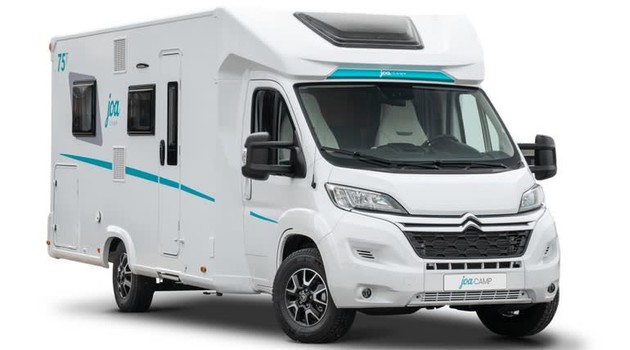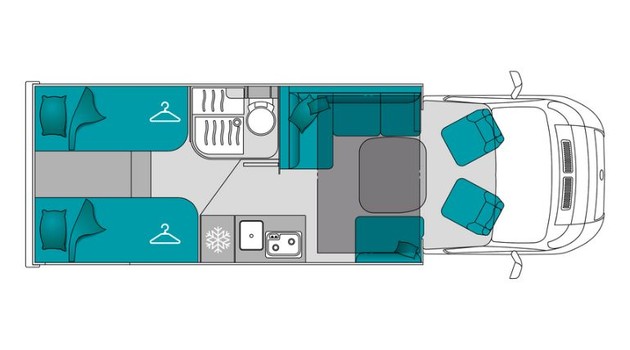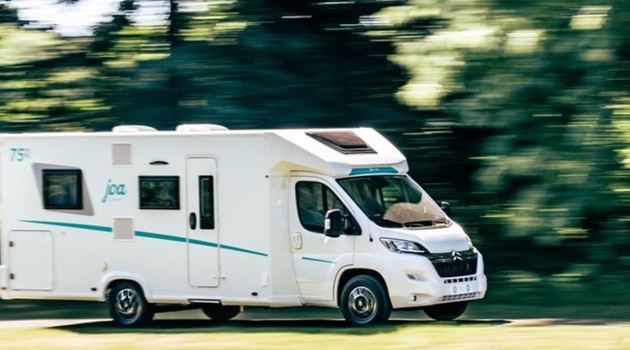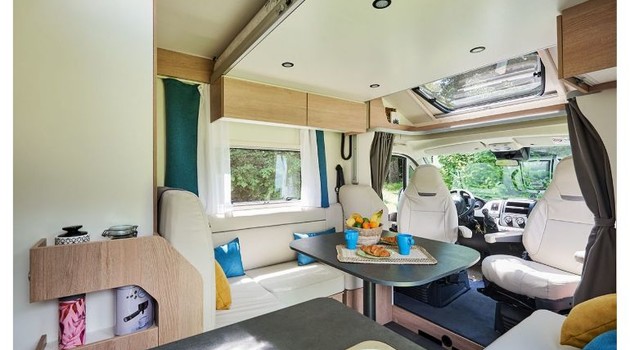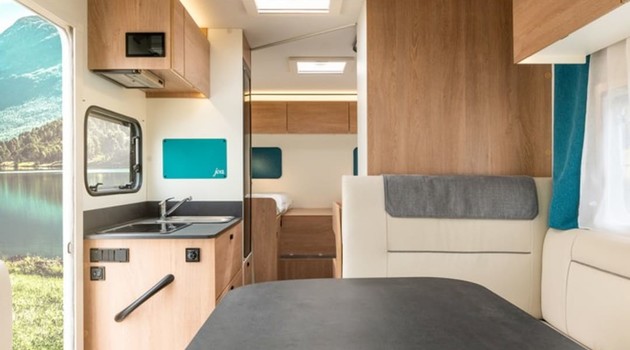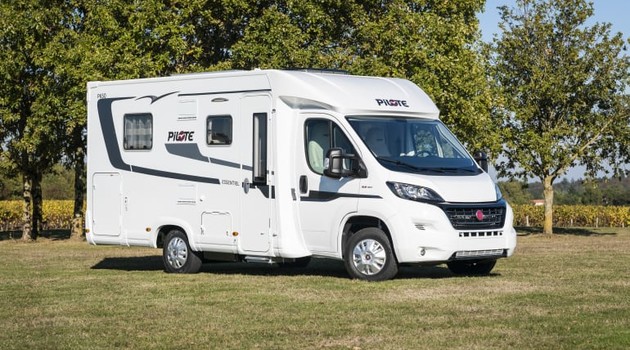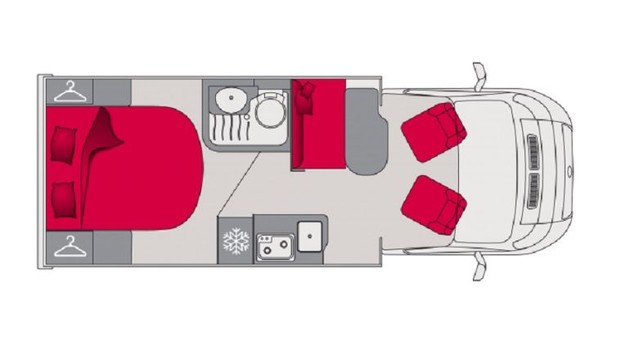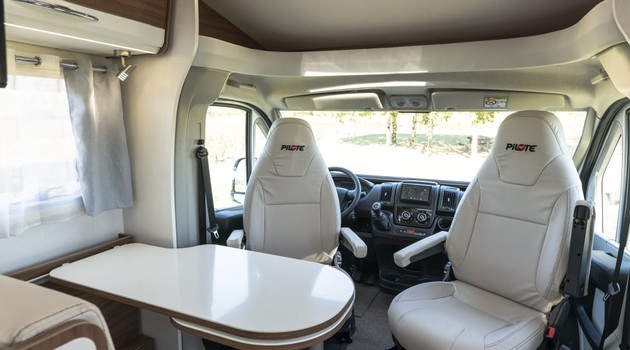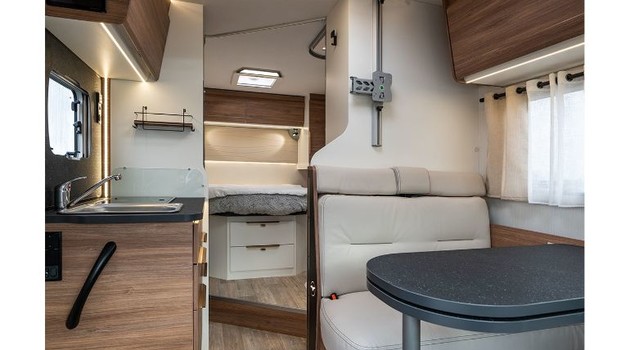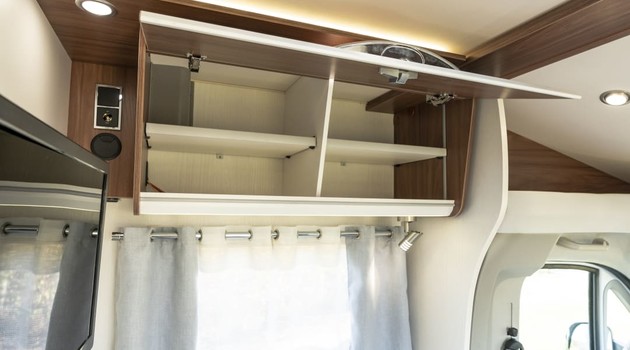Understanding the license requirements is essential, whether you plan to rent or buy a motorhome. It not only helps you avoid issues during inspections but also ensures you’re driving legally and safely. For both beginners and experienced travelers, a quick reminder of the basic rules makes it easier to hit the road with peace of mind.
Understanding GVWR and its impact on the required license
GVWR or Gross Vehicle Weight Rating, refers to the maximum weight a vehicle can reach when fully loaded. This includes the motorhome’s empty weight, passengers, luggage, water, fuel, and any additional equipment. This information is indicated on the vehicle registration document and is a key factor in determining which driving license you need.
In France, regulations divide vehicles into two main categories :
→ Vehicles with a PTAC of 3.5 tons or less
→ Vehicles with a PTAC over 3.5 tons
Why is this distinction so important ? Because beyond this threshold, a standard B license is no longer sufficient. The type of license required depends directly on the vehicle’s GVWR, and sometimes on the presence of a trailer. This categorization affects not only driving legality but also road rules (such as speed limits and city center access).
Before heading out on your adventure, it’s crucial to check your motorhome’s PTAC to ensure it matches your current driving license.
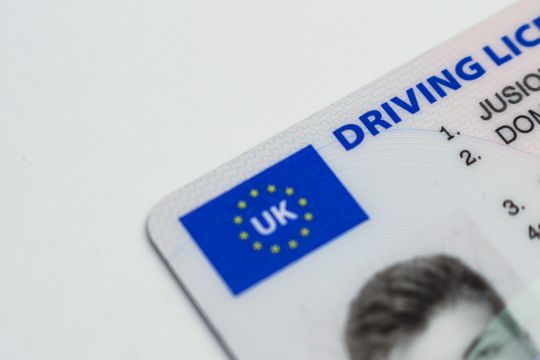
Which license do you need to drive a motorhome based on its weight ?
Category B license : for vehicles up to 3.5 tons
Good news : in most cases, a standard category B license is enough to drive a motorhome. This license allows you to drive vehicles with a GVWR (Gross Vehicle Weight Rating) of up to 3.5 tons, with a maximum of 9 seats (including the driver). This covers all AVIS explore vehicles, from motorhomes to campervans available for rent or purchase.
Category C1 license : for vehicles between 3.5 and 7.5 tons
If you choose a larger model, such as certain heavy-duty motorhomes, a C1 license is required. This license allows you to drive vehicles with a GVWR between 3.5 and 7.5 tons, provided it’s for non-commercial use.
This type of license requires both theoretical and practical training, often provided by specialized driving schools, and can be obtained from age 18 with a medical check-up.
BE and B96 licenses : for heavier trailer setups
If you’re towing, the situation becomes a bit more complex:
→ If the trailer has a GVWR over 750 kg and the combined vehicle + trailer weight exceeds 3.5 tons but remains ≤ 4.25 tons, you need to complete the B96 training.
→ If the total weight exceeds 4.25 tons, a BE license is mandatory.
These setups mainly concern travelers who want to carry a motorcycle, quad bike, or boat along with their motorhome.
Exceptions and special cases
If you obtained your Category B license before 20 January 1975
If you received your driving license before this date, you benefit from a special exemption. The code 79 on your license indicates that you are authorised to drive certain vehicles with a GVWR over 3.5 tons, without needing a Category C1 license. This exemption is especially valuable for experienced drivers wishing to travel with larger vehicles.
It’s important to note that each rental company may have its own requirements. At AVIS explore, rentals are generally available from the age of 23 with at least 3 years of driving experience, even for models ≤ 3.5 t. These rules are meant to ensure safe and confident driving, particularly with large or unfamiliar vehicles.
However, for younger adventurers under 23, if you have held a standard car license for at least a year, the “young driver” option is available. This allows you to be insured when renting our vehicles, but note that the deductible increases to €5,200 per incident—so drive carefully !
If you are planning a road trip outside France, be aware of international regulations! Some countries, like the UK, have higher minimum age requirements (often 21), while in the United States, driving licenses are issued from the age of 16. Before you leave, make sure your driving license is valid for the destination country to avoid any unpleasant surprises at the border.
Insurance and responsibilities depending on the license type
Driving a motorhome also means taking responsibility, especially in case of accidents or traffic violations. Complying with the license requirements is essential for your insurance to remain valid !
- Insurance and license validity
If you drive a vehicle that exceeds the limits of your license (e.g., a motorhome with a GVWR over 3.5 tons using only a Category B license), you risk :
→ Losing your insurance coverage in case of an incident
→ Receiving a fine and/or facing legal action
→ Having repair costs refused by the insurer
In short, having the wrong license category can completely void your coverage in case of an accident.
- Insurance depending on the vehicle category
Motorhomes in the C1 category are considered heavy vehicles, which means the insurance policy must be tailored to this status. This often involves:
→ Higher premiums
→ Specific conditions for parking and circulation
→ A larger security deposit
Before hitting the road, always check your insurance policy or rental terms to ensure peace of mind while driving.
Is special training or a specific license required for certain vehicles ?
For driving a standard motorhome under 3.5 tons, no additional training is required if you already hold a Category B license. However, for larger vehicles, such as heavy-duty motorhomes or high-end models, it may be recommended to take a short training course to better understand:
→ Larger dimensions (height, length, turning radius)
→ Longer braking distances
→ Handling of specific equipment (trailers, dual axles, etc.)
Some driving schools offer short improvement sessions lasting just a few hours. While not mandatory, this is an excellent way to build confidence before setting off on a long journey.
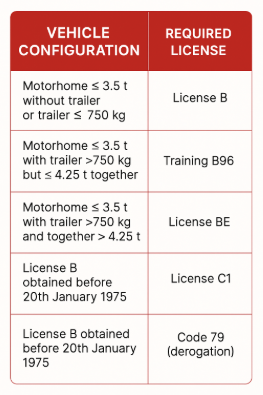
Traveling abroad with a motorhome : what steps should you take ?
If you’re planning a road trip across Europe or beyond, it’s important to check the specific requirements of your destination country, such as:
→ Recognition of your license (a French license is valid throughout the EU).
→ Any official translations or international driving permits required outside the EU.
→ Local traffic regulations (low-emission zones, toll highways, etc.).
For example, Italy and Germany sometimes require environmental stickers to access certain city centers. Parking rules for motorhomes can also vary greatly from one country to another.
Tip: always check with your rental company (such as AVIS explore) or visit official government websites before you set off.
Practical tips for driving a motorhome
Driving a motorhome even with a Category B license requires some adjustment. Here are a few tips for staying safe on the road:
→ Take time to get used to the vehicle’s dimensions (especially height and width in tunnels or car parks).
→ Adjust your speed, especially on curves or in strong winds.
→ Leave extra braking distance, as a loaded motorhome is heavier than a car.
→ Check how weight is distributed inside the vehicle to avoid imbalance.
→ If you’re driving a Category C1 model, follow the specific speed limits for vehicles over 3.5 tons.
By following these recommendations, you’ll enjoy a smoother journey and fully experience the freedom that motorhome travel offers.
Ready to get behind the wheel of a motorhome and set off on an adventure ? Trust AVIS explore to rent you a vehicle perfectly suited to your license and your travel plans. The open road, nature, and freedom are all yours safely and with complete peace of mind !
FAQ
Do you need a special license to drive a motorhome ?
No, for most motorhomes with a GVWR (Gross Vehicle Weight Rating) of 3.5 tons or less, a standard Category B license is sufficient.
Which license is required for a motorhome over 3.5 tons ?
In this case, you need a Category C1 license, which allows you to drive vehicles between 3.5 and 7.5 tons.
What’s the difference between a Category B and a Category C1 license ?
A Category B license covers vehicles up to 3.5 tons, while C1 applies to heavier models (up to 7.5 tons). The C1 requires additional training and a separate exam.
Can I tow a trailer with a motorhome ?
Yes, if the trailer’s GVWR is 750 kg or less, your Category B license is enough. Beyond that, you’ll need B96 training or a BE license, depending on the total combined weight.
Is my French driving license valid abroad for driving a motorhome ?
Yes, within the EU. Outside the European Union, an international driving permit may be required depending on the country (e.g., USA, Australia).
Discover our other motorhome travel tips
Our leitmotiv at AVIS explore is to help you enter the wonderful world of motorhome travel and to make you a seasoned motorhome traveler from your very first experience with AVIS explore! Discover our selection of motorhome travel tips to prepare your next motorhome exploration!
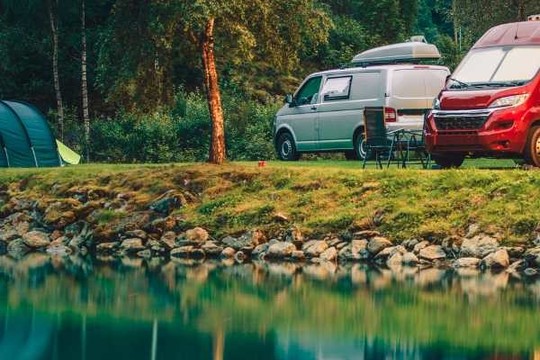
Choosing the right campsite for a motorhome holiday
How to choose the right campsite when traveling by motorhome? All our advice for a successful road trip
DISCOVER

Motorhome rental : Why choose AVIS explore insurance?
Renting a motorhome means, above all, choosing freedom. At AVIS explore, we know that this freedom must go hand in hand with peace of mind. That’s why our insurance policies are designed to support you every step of your journey.
READ MORE
Find out more about our vehicles
